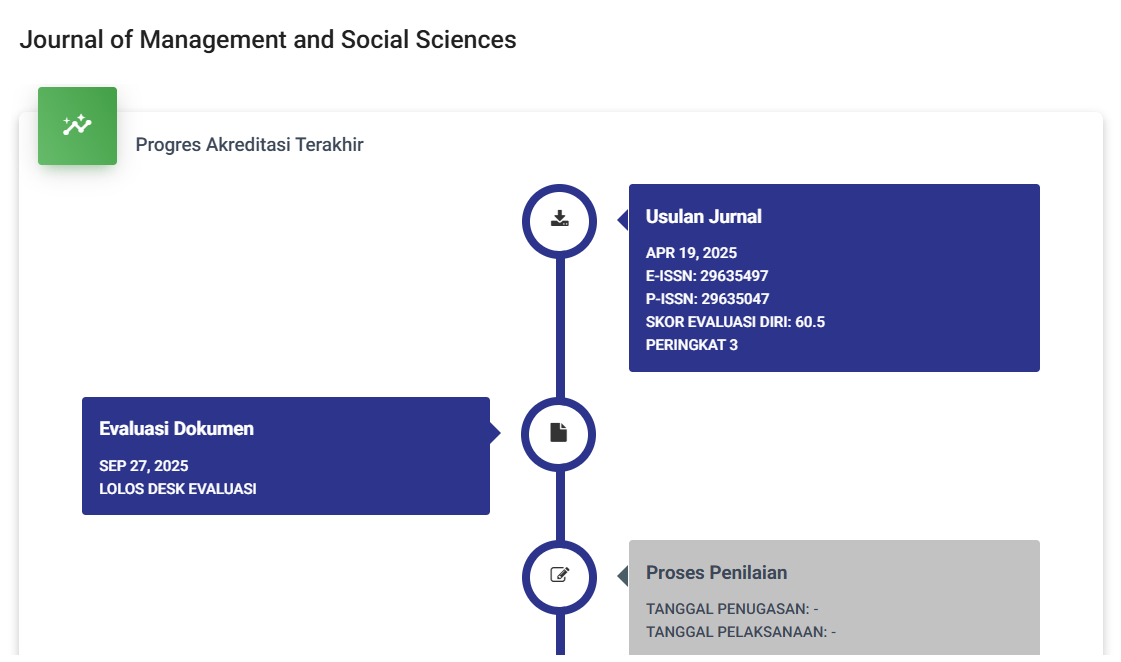The Impact Of Financial Literacy On Human Capital Development In Micro, Small And Medium Enterprises
DOI:
https://doi.org/10.55606/jimas.v2i4.1121Keywords:
Financial literacy, Human capital development, Micro, Small, Medium Enterprises (MSMEs), Qualitative study, Thematic analysisAbstract
This qualitative study aims to explore the impact of financial literacy on human capital development within micro, small, and medium enterprises (MSMEs). The research utilizes a descriptive qualitative approach to delve into the intricate relationship between financial literacy and human capital enhancement. Sampling technique employed purposive sampling to select MSMEs owners and employees who possess varying degrees of financial literacy. Data analysis involves thematic analysis, allowing for the identification of recurring patterns and themes within the collected data. The findings underscore the pivotal role of financial literacy in fostering human capital development within MSMEs, highlighting its significance in promoting entrepreneurial success, enhancing decision-making processes, and facilitating business growth. This study contributes to the existing body of knowledge by providing insights into the mechanisms through which financial literacy influences human capital development within the context of MSMEs.
References
Ayyagari, M., Beck, T., & Demirguc-Kunt, A. (2007). Small and medium enterprises across the globe. Small Business Economics, 29(4), 415-434.
Beck, T., & Demirgüç-Kunt, A. (2006). Small and medium-size enterprises: Access to finance as a growth constraint. Journal of Banking & Finance, 30(11), 2931-2943.
Beck, T., Demirgüç-Kunt, A., Laeven, L., & Maksimovic, V. (2006). The determinants of financing obstacles. Journal of International Money and Finance, 25(6), 932-952.
Benardi Benardi, Grace Yulianti, Ekawahyu Kasih, & Farah Qalbia. (2023). The Role Of Financial Literacy On MSMEs : A Qualitative Investigation. Proceeding of The International Conference on Business and Economics, 1(2), 277–284. https://doi.org/10.56444/icbeuntagsmg.v1i2.1459
Braun, V., & Clarke, V. (2006). Using thematic analysis in psychology. Qualitative Research in Psychology, 3(2), 77-101.
Cahyatih Kumandang, Ruslaini Ruslaini, Seger Santoso, & Muhammad Rizal. (2022). Optimizing Organizational Performance : Exploring The Integration Of AI And HR Practices. The International Conference on Education, Social Sciences and Technology (ICESST), 1(2), 269–277. https://doi.org/10.55606/icesst.v1i2.381
Ekawahyu Kasih, Cahyatih Kumandang, & Yessica Amelia. (2023). Empowering MSMEs Through Financial Literacy And Management Skills. The International Conference on Education, Social Sciences and Technology (ICESST), 2(2), 596–602. https://doi.org/10.55606/icesst.v2i2.379
Ekawahyu Kasih, Farah Qalbia, & Novrizal Novrizal. (2022). Empowering Talent In The Age Of Artificial Intelligence: Innovations In Human Resource Management. The International Conference on Education, Social Sciences and Technology (ICESST), 1(2), 287–295. https://doi.org/10.55606/icesst.v1i2.383
Eri Kusnanto, Ngadi Permana, & Benardi Benardi. (2023). Strategic Financial Fluency: Catalyst For Growth In Micro, Small, And Medium Enterprises. Proceeding of The International Conference on Business and Economics, 1(2), 294–305. https://doi.org/10.56444/icbeuntagsmg.v1i2.1461
Guest, G., Bunce, A., & Johnson, L. (2006). How many interviews are enough? An experiment with data saturation and variability. Field Methods, 18(1), 59-82.
Klapper, L., Lusardi, A., & Van Oudheusden, P. (2015). Financial literacy around the world: Insights from the Standard & Poor's Ratings Services Global Financial Literacy Survey. The World Bank.
Kumar, K. (2012). Financial literacy among micro, small, and medium enterprises: A study with special reference to Perambalur District, Tamilnadu, India. International Journal of Management Research and Reviews, 2(1), 97-108.
Levenson, A. R., & Zoghi, C. (2015). Self-employment and the role of health insurance: Evidence from Massachusetts. Journal of Business Venturing, 30(3), 378-394.
Lusardi, A., & Mitchell, O. S. (2008). Planning and financial literacy: How do women fare? American Economic Review, 98(2), 413-417.
Lusardi, A., & Mitchell, O. S. (2014). The economic importance of financial literacy: Theory and evidence. Journal of Economic Literature, 52(1), 5-44.
Manafi, M., Shekarchizadeh, A., Zarei, H., & Manafi, M. (2017). The role of human capital development in organizational performance. Journal of Applied Environmental and Biological Sciences, 7(8), 82-92.
Mohammad Chaidir, Grace Yulianti, Seger Santoso, & Cahyatih Kumandang. (2023). Financial Management Proficiency For MSMEs. Proceeding of The International Conference on Business and Economics, 1(2), 285–293. https://doi.org/10.56444/icbeuntagsmg.v1i2.1460
Muhammad Rizal, Novrizal Novrizal, Dadang Irawan, & Mia Christy Patricia. (2023). Human Potential in the AI Era: Strategies for Cultivating Exceptional Talent. The International Conference on Education, Social Sciences and Technology (ICESST), 1(2), 260–268. https://doi.org/10.55606/icesst.v1i2.380
Palinkas, L. A., Horwitz, S. M., Green, C. A., Wisdom, J. P., Duan, N., & Hoagwood, K. (2015). Purposeful sampling for qualitative data collection and analysis in mixed method implementation research. Administration and Policy in Mental Health and Mental Health Services Research, 42(5), 533-544.
Patricia, M. C. (2023). Sustainable Retail Financing in Turbulent and Difficult Market Conditions: A Dynamic Capability Perspective. Journal of Management and Entrepreneurship Research, 4(1), 17-29. https://doi.org/10.34001/jmer.2023.6.04.1-35
Ruslaini Ruslaini, Dadang Irawan, Farah Qalbia, & Seger Santoso. (2022). Optimizing Human Capital in the Era of AI Advancements : Strategi for the Future Workforce. The International Conference on Education, Social Sciences and Technology (ICESST), 1(2), 278–286. https://doi.org/10.55606/icesst.v1i2.382
Schneider, C., & Veugelers, R. (2010). On young highly innovative companies: Why they matter and how (not) to policy support them. Industrial and Corporate Change, 19(4), 969-1007.
Santoso, S., Qalbia, F., & Benardi, B. (2023). Dampak Pandemi Covid 19 Terhadap Kinerja Keuangan Bank Umum di Indonesia. ASSET: Jurnal Manajemen dan Bisnis, 6(1). doi: https://doi.org/10.24269/asset.v6i1.7133
Schultz, T. W. (1961). Investment in human capital. The American Economic Review, 51(1), 1-17.
Downloads
Published
Issue
Section
License
Copyright (c) 2023 Erwin Ernestus Kadar Slamet

This work is licensed under a Creative Commons Attribution-ShareAlike 4.0 International License.








